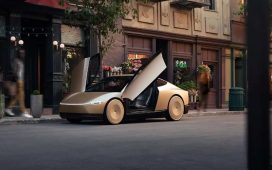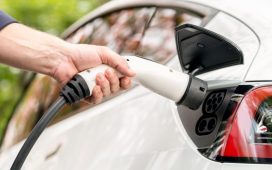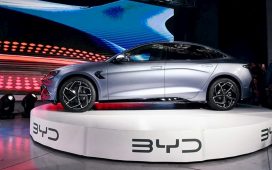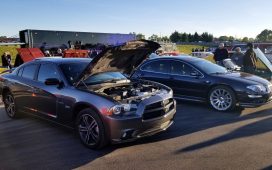The VW Group delivered 189,400 battery-electric cars between the beginning of July and the end of September. It delivered 209,900 units in the same period in 2023, so BEV deliveries dropped 9.8 per cent in 2024. In the current year, the German company delivered 506,500 electric cars worldwide, compared to 531,500 vehicles in 2023 – a decrease of 4.7 per cent.
In the third quarter, Volkswagen delivered 2.176 million vehicles to customers globally across all drive types. The 189,400 EVs represent a share of 8.7 per cent. Calculated for the current year, the share is 7.8 per cent after nine months.
A look at the markets reveals varying trends: in Europe, deliveries in Q3 fell by 11.9 per cent from 124,000 EVs in the previous year to 109,200 vehicles. In China, the Group even increased deliveries by 5.2 per cent – from 54,700 to 57,500 electric cars. On the other hand, business plummeted in the US: 11,900 electric vehicles are almost 42 per cent fewer than in the third quarter of 2023.
EV sales in China increase, contrary to the trend
However, these figures should be seen in the context of the overall market dynamics. In Europe, VW recorded a slight decline of 0.9 per cent across all drive types with 2.79 million vehicles – meaning that EVs lost a disproportionate amount of sales. Their share was 3.9 per cent. In North America, VW was even able to increase sales by 7.4 per cent to 769,000 units, while electric car sales collapsed. There, the EV share in Q3 was just 1.55 per cent.
The situation in China is worth noting. Deliveries there fell by 15 per cent, while deliveries for electric cars increased. In the market where VW is regularly said to be weak on electric vehicles, the EV share in Q3 was more than twice as high as in Europe at 8.1 per cent.
The declines in Q3 are also clearly visible across the brands, especially in the passenger car segment. Only the commercial vehicle brands Volkswagen Truck & Bus, Scania and the ‘international’ brands are up – albeit at a very manageable level in some cases. However, all of the Group’s passenger car brands reported more or less significant declines, as the following table shows:
| Q3 2024 | Q3 2023 | Compared with previous year % |
Q1-Q3 2024 | Q1-Q3 2023 | Compared with previous year % |
|
|---|---|---|---|---|---|---|
| Grand Group Core | 142,300 | 152,100 | -6.5 | 373,200 | 379,400 | -1.6 |
| Volkswagen Pkw | 102,700 | 108,200 | -5.1 | 271,200 | 273,000 | -0.7 |
| Škoda | 21,300 | 23,100 | -7.8 | 50,800 | 54,400 | -6.7 |
| SEAT/CUPRA | 12,900 | 13,500 | -4.4 | 31,200 | 32,300 | -3.7 |
| Volkswagen Nutzfahrzeuge | 5,400 | 7,300 | -26.3 | 20,000 | 19,600 | +2.2 |
| Brand Group Progressive | 39,100 | 47,400 | -17.4 | 115,800 | 123,000 | -5.9 |
| Audi | 39,100 | 47,400 | -17.4 | 115,800 | 123,000 | -5.9 |
| Bentley | – | – | – | – | – | – |
| Lamborghini | – | – | – | – | – | – |
| Brand Group Sport Luxury | 7,400 | 9,900 | -25.0 | 16,400 | 27,900 | -41.0 |
| Porsche | 7,400 | 9,900 | -25.0 | 16,400 | 27,900 | -41.0 |
| Brand Group Trucks / TRATON | 500 | 500 | -1.3 | 1,100 | 1,200 | -4.4 |
| MAN | 150 | 280 | -46.7 | 380 | 670 | -43.0 |
| Volkswagen Truck & Bus | 10 | 10 | +180.0 | 100 | 40 | +139.0 |
| Scania | 80 | 40 | +81.8 | 190 | 190 | +0.0 |
| International | 290 | 210 | +37.0 | 460 | 280 | +65.1 |
| Volkswagen Group (total) | 189,400 | 209,900 | -9.8 | 506,500 | 531,500 | -4.7 |
At Skoda, Cupra and Porsche, registrations have so far been dependent on one model each – Porsche will soon remedy this situation with the electric Macan as a volume model (for the brand). At the same time, Skoda is about to launch the Elroq. So, there could soon be a trend reversal there. But even the VW brand, with numerous ID. models in various segments, cannot evade the current decline, as the 5.1 per cent drop in sales shows. However, with 102,700 electric cars, the core brand contributed more than half of the Group’s electric sales in the third quarter – 54.2 per cent, to be precise.
It is thus hardly surprising that the Group’s two best-selling electric models bear the VW logo: the ID.4/ID.5 duo was sold 135,200 times so far this year, followed by the ID.3 with 105,900 units. The MEB models Audi Q4 e-tron (incl. Sportback) with 78,800 units, the Skoda Enyaq (incl. Coupé) with 50,800 units, and the Cupra Born (29,600 units) occupy third to fifth place. Audi delivered 23,900 units of the Q8 e-tron in the first three quarters, but sixth place should soon go to the VW ID.7 (incl. Tourer). With 22,200 units sold, it has already overtaken the ID. Buzz (incl. Cargo) with 20,000 units.
“In Europe, we were able to keep our vehicle handovers to customers largely stable, but are experiencing significant headwinds from the market.,” says Marco Schubert, a member of the Group’s Extended Executive Committee for Sales. “The competitive situation in China is particularly intense, which is the main reason for the global decline in our deliveries. In the coming months, numerous attractive new models across all brands will strengthen our market position worldwide.
However, the focus is not only on the models. VW is currently also very concerned with costs, as the discussion about possible plant closures in Germany shows. “In addition, however, a better cost base, particularly in Germany, is essential to remain successful in this environment in the future,” says Schubert.











